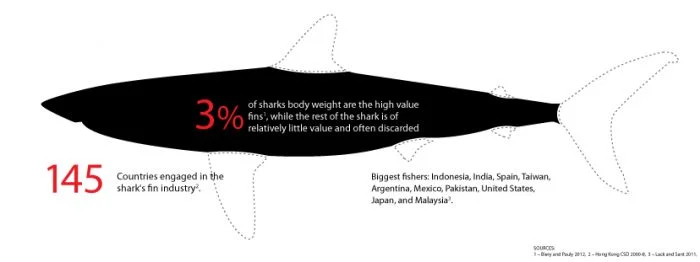Sharks are friends not food!
Sharks kill up to 10 people each year.
Shockingly, humans kill between 70 and 100 million sharks per year.
So which species is a bigger threat? In just over a century we could quite easily wipe out more then 400 million years of shark evolution and rid the world of it's sharks all together.
Ok, so we all know that sometimes sharks do attack humans, causing devastating injuries and, in some cases, death. But other animals are also responsible for some human deaths too, why do shark attacks fascinate us so? Back when Peter Benchley's creation Jaws was released, sharks were public enemy number one. Peter himself began to learn about the horrific truth of shark finning, witnessing firsthand sharks being captured and de-finned" and thrown back into the ocean to die. This put him on the road to becoming a conservation activist. Find out more about Peter Benchley and his work by clicking on this picture!
Being afraid of sharks is no longer such a problem. Shark fishing has become big business and will soon lead to some shark species becoming extinct if we don't try to save them.
In 2013 Indonesia was one of the largest exporters of shark fins, a disturbing fact that local charities and shark conservation organisations are fighting to change. Indonesia catches more sharks than any other country in the world. In 2004 it caught 15% of the world's total catch, a whopping 122,000 tonnes. The current level of shark fishing is completely unsustainable, both economically and ecologically. In just a few years, shark species that are seen as common, such as the black tip reef shark, will become extinct. Regulations on how much fishermen can catch have been put in place, but policing this has proven difficult. Changing the views of the local people who rely on catching sharks for their livelihood is quite impossible and is what we are up against if we wish to change the current situation;
“One fisherman claimed that the need to fish for shark, which is very lucrative, has gone up because climate change has made traditional catches scarce. He said, “I don’t care about the regulation. As long as the demand in the village market is still robust I will catch and sell sharks. … If you only aim to catch tuna nowadays you will often come back empty.” ”
Sharks are at the top of the food chain. They play an important role in our oceans, a role that other fish cannot imitate. Keeping other populations of fish healthy and in proportion, they weed out the sick and are the apex predator. Sharks regulate the behavior of prey species Where sharks are eliminated, the ecosystem loses it's balance. Sharks are important and they are really cool! Spotting a shark on a dive and swimming alongside one of these magnificent creatures is both amazing and humbling.
To celebrate Shark week, let's take a look at the sharks that are regularly spotted around the Gili islands.
Black Tip Reef Shark
The black tip reef shark tends to be quite timid and skittish. They do not really pose a threat to humans, but have been known to have a nibble on a few legs that have waded into shallow waters where these creatures are. They tend to grow to around 1.4m-1.6m in length and are regularly spotted here in the waters surrounding the Gili islands. hey do prefer shallower water and are often seen cruising over reef ledges and sandy flats. Like many sharks, the black tip keeps on swimming. It does so because it cannot pump water into it's gills in order to breathe. Therefore, it needs to force the entry of water through it's mouth so that it can pass through the gills and out of the gill slits, supplying him with oxygen, meaning that he must swim constantly!
White Tip Reef Shark
Growing no larger than 1.6m, not relying on ram ventilation, this little guy is able to pump water over it's gills without moving. They can usually be found hiding in caves or underneath coral bommies during the day time. They hunt at night mostly feeding on small bony fish and octopus. The white tip is one of the most commonly found shark in Indo-pacific reefs. They are very rarely aggressive towards humans, but may come in for a close look at the odd diver that swims by, especially spear fishers who have a juicy looking catch on the end of their spear!
Bamboo Shark
A bit more of a rare sighting around the Gilis, the bamboo shark is often found in shallower waters feeding on bottom dwelling invertebrates. likely to only reach around 1.2m, this little guy can also be known as a carpet shark. Bali Sharks recently delivered 6 bamboo shark eggs to the Gilis, where they were looked after until they hatched. They were then released into the rich waters around our BioRock project. They have even been spotted by a few lucky divers! There are over 100 different species of Bamboo shark, making it the largest family of sharks!
Whale Shark
Ok, so it is very rare that you will see these big, beautiful creatures cruising around the Gili islands, but they have been spotted! They are very slow moving, filter feeders that can reach up to 12m in length and can live for up to 70 years! It's mouth alone can be up to 1.5m wide and contains between 300 and 350 rows of tiny teeth and 10 filter pads for filter feeding. They can process up to 6,000 liters of water an hour through it's gills. Whale sharks, despite their size, do not pose a threat to humans. They are docile and it has even been noted for swimmers or divers to catch a ride from a whale shark (obviously you are not encouraged to do this!) After giving birth, the mother shark leaves the young to fend for itself. The younger whale shark is extremely gentle and have been known to play with surrounding divers. Their threat is sadly set at vulnerable. Being lucky enough to see one is a humbling experience that divers will never forget!
Sharks are being fished to extinction, but it is not too late to change this if we all act now. You may think that there is not much you can do unless you are living in a country where you can be on the frontline. This is not the case. Here are a few things that you can do in your daily life to help save the sharks!
1. Do not consume or purchase shark products
Most people know about shark fin soup. But there are more products then this that you should be avoiding. Shark steaks can be disguised as "white fish" so unless you know what you are eating, don't eat it! Imitation crab, lobster or shrimp can contain shark. Shark meat is really bad for you due to it's high levels of mercury.
2. Know what you are buying
Shark products are often re-labelled, so be sure that what you are buying doesn't have the possibility of being from sharks. Some fish may also be re-labelled as rock-salmon or pollock. The ingredient chondroitin can be derived from shark cartilage. Cosmetics with squalene, or shark liver oil, should not be on your shelves. Avoid any lotions and potions with this ingredient in or just buy cruelty free products!
3. Go elsewhere
If you know that a business or restaurant is selling shark products then don't give them your money! Even if you are not buying the particular items, your money is still going towards funding a business that clearly supports shark products.
4. Be smart when eating seafood
You can still enjoy eating seafood, but just be clever about it. Make sure that you only eat fish that come from a sustainable source. To find out more about this you can download a fishcard for your local area or check out this website for more details: http://www.mcsuk.org/downloads/fisheries/PocketGoodFishGuide2014.pdf Eat fish, but be informed about what to eat and what to avoid!
5. Make sharks more valuable alive than dead!
Sharks are not blood thirsty man eaters. Get in the water with them and learn more about them, get to now them and help to show the world that they are worth more to us alive than they are dead. Help to increase shark diving and shark tourism, in the long run this will be better for our oceans.
Sharks play a major part in the eco-system of our oceans. Losing them means upsetting a whole system that has been running perfectly for millions of years. Let's help to save it!







